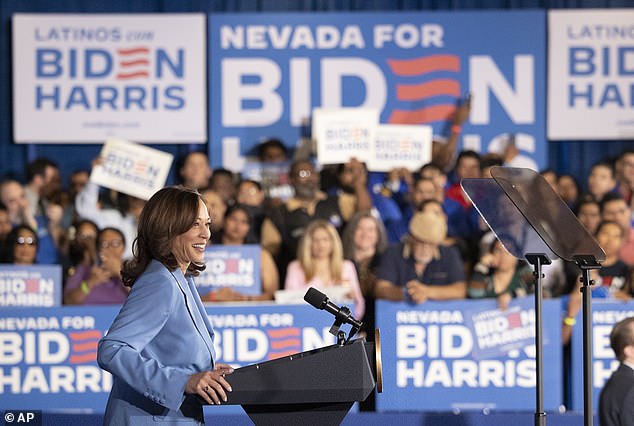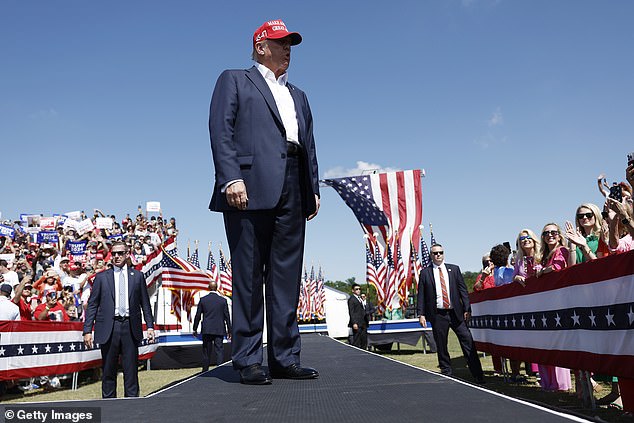How Cutting Biden From the Democratic Ticket Could Cost His Replacement as Much as $240 MILLION, With One Exception
President Biden is facing increasing calls from Democrats to withdraw from the presidential race after his disastrous performance in the debates, with potential replacements being floated far and wide.
Biden has so far resisted the pressure, insisting he can still beat Trump in November. However, should the 81-year-old change course and drop out of the race, there are a number of obstacles other Democratic candidates could face.
One of the biggest challenges: how to raise a massive amount of money in a short period of time to take on Trump. Biden’s massive campaign funds wouldn’t necessarily flow to a replacement for the president at the top of the ticket.
And that’s a significant amount of money they could be leaving behind.
President Biden’s campaign announced it had raised $127 million in June and had $240 million in cash at the end of last month
Even though Biden is struggling in the polls and the first debate was a failure, his campaign has still made money.
The Biden campaign announced Tuesday that it raised $127 million last month, the campaign’s best month of fundraising to date. It had the best grassroots fundraising hour of the entire campaign from 11 p.m. to midnight the night of the debate.
In the second quarter of the year, Biden’s team raised a total of $264 million, closing last month with $240 million in cash.
But if Biden drops out of the race, all that money won’t automatically go to the next Democratic presidential candidate.
Federal candidates are allowed to send unlimited amounts of money to the national party. If Biden were to drop out of the race, the money could go entirely to the Democratic Party, which could then spend it on the new nominee.
But the campaign can’t simply transfer the money directly to the nominee, as there is a $2,000 limit per candidate per election.
“In order for the withdrawing candidate’s committee to deposit the money into the campaign account of a successor candidate, the withdrawing candidate must return the money to the original donors, who can then contribute to the new candidate’s campaign,” explained Trevor Potter, president of the Campaign Legal Center.
Some major Democratic donors delayed making decisions on the race immediately after Biden’s appearance as they waited to see what the debate would mean for the polls.
Others called for Biden to resign after his horrific debate.
On Tuesday, some Democratic donors appeared to be gathering in a circle, telling DailyMail.com that they were getting to work to get Biden elected, ending the time of panic over the debate.
Some of the names being mentioned as possible replacements include Governors Gavin Newsom (California), Gretchen Whitmer (Michigan) and Josh Shapiro (Pennsylvania), as well as Transportation Secretary Pete Buttigieg.
But there’s one name floating around who could easily use all that campaign cash as a replacement candidate: Vice President Kamala Harris.
Campaign finance law allows her to share a campaign committee with Biden, because the president and vice president are running together as one candidate and her name is already authorized.

Vice President Kamala Harris could use the campaign cash as she shares a campaign committee with the president as his running mate should Biden withdraw from the race.
“If President Biden were no longer a candidate and Harris were to become her successor, she would retain access to all funds on the committee and could use them to advance her candidacy for president,” Potter said.
The amount of money she could access is significant: by the end of June, the campaign already had $240 million available.
Later this month, data from the federal elections will become clearer, showing how much of that is specifically with Biden’s campaign committee and how much with the party.
On Tuesday, former Ohio congressman Tim Ryan became the first prominent Democrat to publicly endorse Harris as Biden’s successor, saying she is ready for the job.
But campaign finance laws could also be a potential point in her favor, as could new polls.
A CNN poll released after the debate looked at hypothetical matchups between Democrats and Trump if Biden did not become the nominee.
While all Democrats backed the former president, Harris came closest in a head-to-head contest: 47 percent to 45 percent among registered voters.
And now, a Reuters poll has found that Michelle Obama is the most notable Democrat who can beat Trump. But there are still more obstacles to her getting the money.
If Harris were not the nominee, the campaign committee could be converted into a political action committee, or PAC. A PAC would be able to make independent expenditures, efforts could not be coordinated, and a PAC could only donate up to $3,300 per election to another candidate.

Trump’s campaign said it raised more than $111 million in June and ended the month with nearly $285 million in cash on hand
If Democrats were to replace Biden, campaign funds would be crucial to their fight to defeat Trump.
The presumptive Republican presidential nominee had nearly $285 million in cash at the end of June, according to his campaign, wiping out Biden’s financial advantage with just four months to go until Election Day.
In total, the ex-president raised $331 million in the second quarter of the year, including $111.8 million last month alone.
